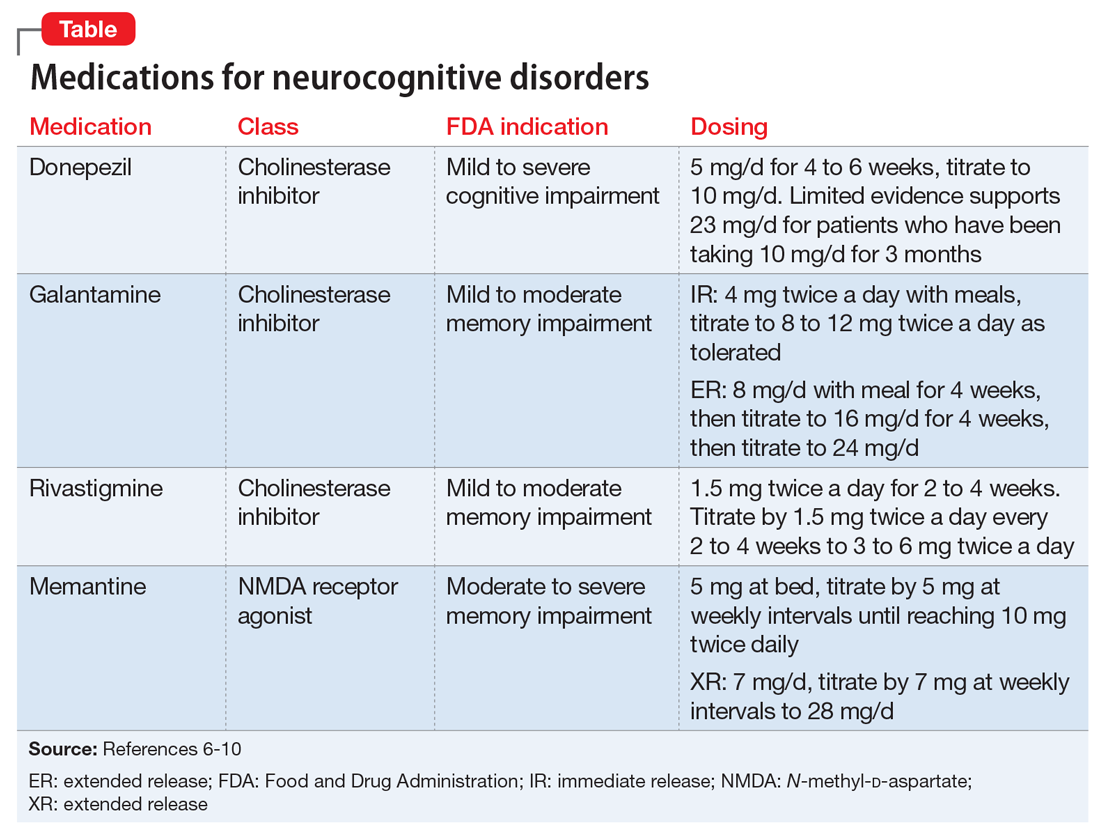Evidence for dementia-specific medications
An alternative to the above pharmacologic options is treatment with a cholinesterase inhibitor and/or memantine. Among cholinesterase inhibitors in the United States, donepezil is approved to treat mild, moderate, and severe dementia, while rivastigmine and galantamine are approved for the treatment of mild to moderate dementia. Memantine is the only NMDA receptor agonist approved in the United States for moderate to severe dementia. The Table6-10 highlights potential dosing regimens for each of these 4 medications.
Few randomized controlled trials (RCTs) of cholinesterase inhibitors or memantine have focused on improvement of NPS as a primary outcome measure, but some RCTs have used treatment of NPS as a secondary outcome.4 Most RCT data for using medications for NPS have come from small studies that lasted 17 days to 28 weeks and had design limitations. Most meta-analyses and review articles exclude trials if they do not evaluate NPS as a primary outcome, and most RCTs have only included NPS as a secondary outcome. We hypothesize that this is because NPS is conceptualized as a psychiatric condition, while dementia is codified as a neurologic condition. The reality is that dementia is a neuropsychiatric condition. This artificial divergence complicates both the evaluation and treatment of patients with dementia, who almost always have NPS. Medication trials focused on the neurologic components for primary outcomes contribute to the confusion and difficulty of building an evidence base around the treatment of NPS in Alzheimer’s disease. Patients with severe NPS are seldom included in RCTs.
A cholinesterase inhibitor, memantine, or both?
In a large, pooled area-under-the-curve analysis, Atri et al11 examined data from 1,408 individuals with moderate to severe Alzheimer’s disease who were enrolled in four 6-month RCTs of memantine with or without donepezil add-on therapy; some participants received donepezil only. This analysis found positive benefits for cognition, function, and behavior among those who received a combination of memantine and donepezil compared with those who received either medication alone. This study was limited to 6 months, it used a measure of cognition without executive function, and most participants were white females. However, 6 months is far longer than most medication trials.
In the absence of extended RCTs, attention turns to the opinions of panels of experts examining available data. There are no recent guidelines from any U.S.-based specialty society that address the use of combination cholinesterase/memantine treatment for NPS of dementia. Since 2013, there has been emerging awareness of the evidence for efficacy and cost effectiveness to support the use of a cholinesterase inhibitor and/or memantine for patients demonstrating cognitive and functional decline due to Alzheimer’s disease, Lewy body dementia, and dementia due to Parkinson’s disease.
The 2012 Fourth Canadian Consensus Conference on the Diagnosis and Treatment of Dementia12 recommended a trial of a cholinesterase inhibitor in most patients with Alzheimer’s disease or Alzheimer’s disease combined with another type of dementia. The panel did not find enough evidence to recommend for or against the use of cholinesterase inhibitors and/or memantine for the treatment of NPS as a primary indication. However, they warned of the risks of discontinuing a cholinesterase inhibitor and suggested a slow taper and monitoring, with consideration of restarting the medication if there is notable functional or behavioral decline.
Continue to: In 2015, the European Neurological Society and the European Federation of Neurological Societies...


